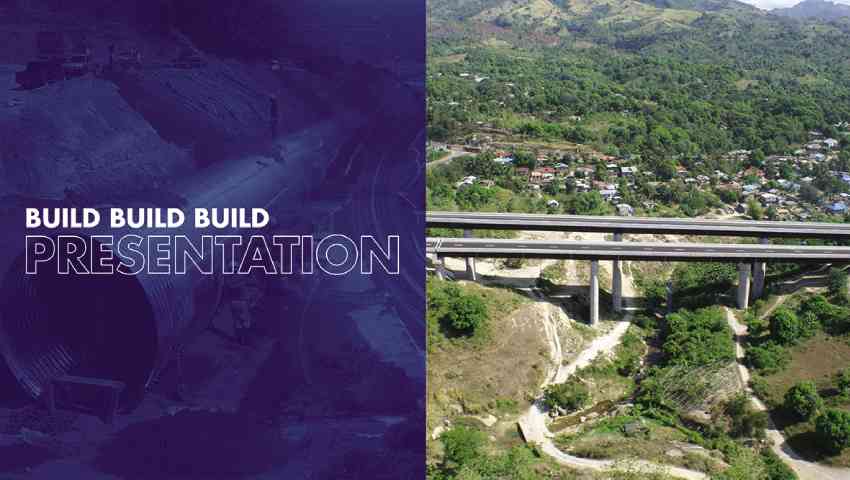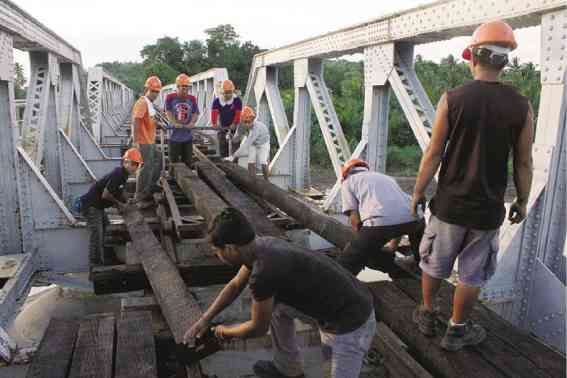
There is a huge anticipation of the Duterte administration’s massive and aggressive infrastructure plan.
The plan is not only expected to usher in what was dubbed as a “golden age of infrastructure,” but is also expected to help make the country a middle-income economy by the end of the President Duterte’s term.
And many investors and stakeholders, including real estate companies, are now on the watch as to how the P9 trillion worth of public infrastructure projects will be rolled out by the government during the six-year term of President Duterte.
Comprehensive list
To help provide the public and the stakeholders a real-time tool to track projects, a transparency portal was launched this week during the “Dutertenomics” forum held on April 18.
A comprehensive list of the big ticket infrastructure projects lined up under the Duterte administration’s “build, build, build” strategy can now be readily viewed on the website, www.build.gov.ph.
This “build, build, build” strategy was meant to address the country’s poor infrastructure system, which was believed to have largely hobbled the country’s economic growth over the past years.
The website will carry information on infrastructure projects such as bridges, airports and ports, which are aimed at increasing the productive capacity of the economy, generating jobs, increasing incomes, and strengthening the investment climate leading to sustained inclusive growth.
Details such as the project name and its short description, the agency that will implement it, estimated cost, location, and the status of the project, as well as photos and videos can be found on the website.
These details are seen as helpful for the country’s largest business groups and investors, who are interested to bid or come up with proposals.
Many of the projects revealed, however, were actually carryovers from the previous administrations.
Also included in the website are “success stories” or information on the projects started or completed during the previous administration.

Priority projects
The portal is administered and managed by the National Economic and Development Authority (Neda), the Department of Transportation (DOTr), the Department of Public Works and Highways (DPWH), and the Bases Conversion and Development Authority (BCDA).
Neda officials had said that the comprehensive list would cover projects to be funded not only by development partners such as the Chinese and Japanese governments as well as multilateral lenders including the Asian Development Bank, the Asian Infrastructure Investment Bank, and the World Bank, but also by the annual national budget.
Most of the projects fall under the DOTr and the DPWH. There are projects to address flooding, water supply, school infrastructure, healthcare, prison quality and power.
The list of projects also included those under public private partnership (PPP) framework such as the South and Southwest Transport System Terminals, the North Luzon Expressway-South Luzon Expressway (NLEx-SLEx) Connector Road, and the NAIA Expressway Phase II Project.
There are five regional airport PPP projects, involving the development, operations and maintenance of the Davao, Laguindingan, New Bohol, Iloilo and Bacolod-Silay airports.
Other projects include the Cebu Bus Rapid Transit and the Philippine National Railways South Commuter.
Infrastructure is among the top priorities of the Duterte administration with the government targeting to spend up to P9 trillion on public infrastructure from 2017 to 2022.
For 2017 alone, the Duterte administration has allocated P850 billion or 5.3 percent of the gross domestic product (GDP) on hard infrastructure, en route to bringing the infrastructure spending-to-GDP ratio to more than 7 percent by 2022 from the current 5 percent.
Sources: Inquirer Archives, ppp.gov.ph, build.gov.ph

